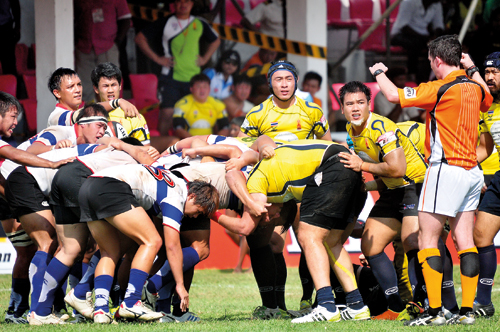‘Conflict of interest’ bane of rugby officials

The interaction between referee and players are far better beyond Sri Lanka, but this game was played in Colombo - File pic
Sri Lanka Rugby (SLR) and the Sri Lanka Society Rugby Football Referees’ Society (SLSRFR) may be in agreement to scrap the controversial ‘Match Review System’ but there are differing views on its usefulness or why it is not serving the purpose.
“Why do you want to scrap the ‘Match Review System’ that is enshrined in the SLR constitution? Anyway, all the affiliated members are bound to adhere to the provisions of the SLR constitution and whatever constitution any affiliated member may have, it has to be consistent with the Sports Law and SLR constitution. I suppose the SLR may want to look at the proposed draft amendment of the Referees Society,” said former Police and Sri Lanka prop Hafeez Marso, who felt the main issue affecting rugby in the country was that of conflict of interest by those officials governing the sport.
“Now, look at CMOs (Coach of Match Officials), TMOs (if any), Assignment Committee. Those who head these committees and its members, all of them hold either top posts in the Referees Society or are paid employees. How can a paid employee be in a system in the administration of justice? Whether you are paid or not, it’s like you being the judge of their own case,” quipped Marso, a retired Deputy Inspector General of Police and an outspoken critic of the system.
“Some of them are in the (SLR) Council and this is by itself is a blatant breach of the Sports Law and SLR constitution. I think the Referees’ Society is very much aware of the interpretation given by the AG’s (Attorney General) Department about Judges, Coaches, Umpires, Referees, etc. who are unqualified to be office bearers or council members of the Home or Provincial Union. The bottom line is the unprecedented ‘conflict of interest’ they are indulging in both the Referees’ Society and the SLR Council,” he pointed out.
“All must understand, that regulatory tools are meant for fair play and transparency for the smooth run of a system. Many just cannot understand this norm. They seem to have no sense, are just dumb and deaf or ignore the well-being of a system to cling on to top posts to get undue social recognition and survival,” stated Marso responding to the Referees’ Society’s intentions to do away with the review system which is unique to Sri Lanka.
Members of the SLSRFR were of the opinion that the concept of the review had been misunderstood by some of the stakeholders in the sport.
“It has a purpose. We can learn from our mistakes. The problem in Sri Lanka is it leads to arguments. In other countries, coaches have friendly discussions with us,” said a leading referee who has officiated in countries such as England and Japan.
“Both coaches and captain talk to me after the game but not necessarily about the match. Here the losing side never speak to us because they get angry.”
The match review invariably turns out to be a post-mortem on the referee’s performance.
“It is not an inquiry only a discussion. I have made mistakes but a decision has to be made in a few seconds. Even World Cup referees like Wayne Barnes makes mistakes. After replays we can see our mistakes and we have to accept it. The problem here is coaches are trying to safeguard their job in schools and clubs. They put the blame on the referee when they lose,” said another experienced referee who felt the review was a good process so long as it not used for fighting.
Another referee said coaches don’t make use of the opportunity to confront the match official soon after the game.
“We have informed all coaches, 45 minutes after match referee warms down and all, he can discuss with the referee for an hour. But no coach comes. In school rugby it does not happen at all. Coaches can point out mistakes and the referee also may realise he made a mistake and apologise. This culture is not there in Sri Lanka,” he said.
Some referees feel there are double standards when it comes to judging local and foreign match officials.
“We are always under pressure. People always look down on Sri Lankan referees. There is no pressure when we blow in other countries. When foreign referees blow matches, even the discipline of players is better. They are scared to foul. Players try to cheat the referee when we blow,” he said pointing out that the worst infringements happen at the breakdown.
“The worst offenders are in the scrum. They want to get the ball on their side by hook or by crook. They try to blindside the referee,” he said reiterating that Sri Lankan referees do their best and there was no need to bring down foreigners.



